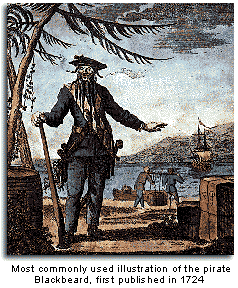The low-lying coastal areas of North Carolina made ideal hiding places for pirate ships. The most famous practitioner of that trade in the early 18th century was Edward Teach, known as Blackbeard for his long, braided black beard.
 He began his career as a privateer in the War of the Spanish Succession (1701-14), preying upon enemy ships with the blessing of the English government. At some point, he became less discriminating in his choice of targets and turned to piracy. He and his crew terrorized the Atlantic coast and the West Indies; they gained a reputation for brutal treatment of captives.
In 1718, Teach retired to the town of Bath, North Carolina and received a pardon from Governor Charles Eden. It was rumored that the governor shared in the pirate's treasure. Teach's presence was generally approved by the townspeople given that he sold his plunder to the public at reasonable prices. Teach quickly became a celebrity and was a frequent dinner guest at the finer homes in the area.
In 1718, Teach and his crew returned to piracy and created havoc along the coasts of North Carolina and Virginia. He was killed in an engagement with the British Navy near Ocracoke Island. His head was severed and dangled from the bowsprit of one of the victorious ships.
He began his career as a privateer in the War of the Spanish Succession (1701-14), preying upon enemy ships with the blessing of the English government. At some point, he became less discriminating in his choice of targets and turned to piracy. He and his crew terrorized the Atlantic coast and the West Indies; they gained a reputation for brutal treatment of captives.
In 1718, Teach retired to the town of Bath, North Carolina and received a pardon from Governor Charles Eden. It was rumored that the governor shared in the pirate's treasure. Teach's presence was generally approved by the townspeople given that he sold his plunder to the public at reasonable prices. Teach quickly became a celebrity and was a frequent dinner guest at the finer homes in the area.
In 1718, Teach and his crew returned to piracy and created havoc along the coasts of North Carolina and Virginia. He was killed in an engagement with the British Navy near Ocracoke Island. His head was severed and dangled from the bowsprit of one of the victorious ships.